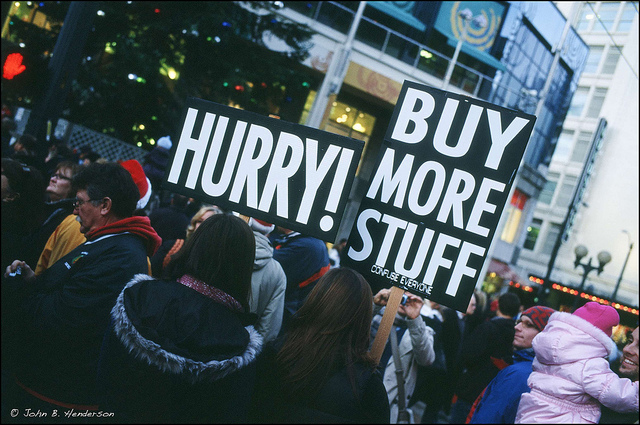Economy Watch: Retailers Clean Up over Thanksgiving Weekend
Americans certainly didn't stay home from the stores on Black Friday, as reports indicate record-breaking retail sales. Today's Cyber Monday numbers look to be similarly encouraging. And the bailout of Italy could cost up to 600 million euros.
November 28, 2011
By Dees Stribling, Contributing Editor
America might still be suffering a recession-like economy, but that didn’t mean Americans wanted to stay home from the stores on Black Friday, or in a few cases, late-night on Thanksgiving. A number of preliminary reports over the weekend indicated record-breaking retail sales for Black Friday and the entire weekend, for that matter — as well as predictions of an uptick or even upsurge in online sales on Cyber Monday.
The National Retail Federation reported on Sunday that a survey conducted by BIGresearch over the weekend found that 226 million shoppers visited stores and websites over Thanksgiving weekend, which includes sales from Thanksgiving Day itself through Black Friday, plus Saturday and an estimate of Sunday’s visits. The total was up from 212 million during the same few days last year, and the average holiday shopper spent $398.62 over the weekend, up from $365.34 a year ago. Total spending reached an estimated $52.4 billion. Some 37.8 percent of the total weekend retail spending, an average of $150.53, was for online purchases, explained the NRF.
Separately, ShopperTrak reported that Black Friday sales increased 6.6 percent over the same day last year. That represents $11.4 billion in U.S. retail purchases, and happens to be the biggest dollar amount ever spent on the day after Thanksgiving, the company said.
“This is the largest year-over-year gain for Black Friday since the 8.3 percent increase we saw between 2007 and 2006,” ShopperTrak founder Bill Martin noted in a statement. “Granted, the economy is still sputtering, but slight increases in the employment rate mean fewer workers fear layoffs. While consumers are still extremely value-conscious, they clearly responded to retailer price reductions and ‘door-buster’ promotions.”
In fact, consumers have been inspired to shop more during much of November, ShopperTrak calculated. Compared with the same weeks last year, sales were up 3.6 percent during the week of Nov. 12, and up 3.8 percent during the week of Nov. 19, which was the week before Black Friday. Large numbers of pre-promotions and extended shopping hours in the weeks leading up to Black Friday are probably factors in these increases, but there’s also the matter of pent-up demand from shoppers who are tired of holding back (and who still happen to be employed).
As for Cyber Monday (a term popularized by the NRF to describe the online cousin of Black Friday), a separate survey by BIGresearch predicts that 122.9 million Americans plan to shop on Cyber Monday this year, up from the 106.9 million in 2010. Retailers are eager to meet the upswing in demand during the day, with 78.4 percent of retailers planning a special promotion for Cyber Monday, according to the NRF.
IMF Reported Planning Italian Bailout as Euro-Zone Remains Wobbly
The Italian press reported on Sunday that the International Monetary Fund is cooking up plans for an enormous bailout of Italy (or should we call it a “rescue package”?), though the deal hasn’t been verified yet. How large will it be? Perhaps as much as 600 billion euros, or nearly $800 billion, edging out the $700 billion bailout that the United States awarded itself back in the darkest days of 2008. It would not, of course, be the first IMF loan to a European country: Iceland, Portugal, Ireland and Greece have all taken their turn at the IMF relief office.
The idea is that the loans would give the new government of Italy a year or so to undertake deficit-cutting and structural changes to the Italian budget. Considering the size of the loan, it’s unlikely that the IMF would go it alone, however. The European Central Bank might figure out a way to participate as well, though as yet the details aren’t clear.
Word of the possible bailout for Italy came after a nervous week for the euro-zone. Toward the end of last week, the ratings agency Standard & Poors downgraded Belgium’s sovereign debt a notch to AA, citing the cost of the recent bailout of Dexia, slow Belgian growth and the longstanding political paralysis that has left the country without a permanent government for nearly a year and half. By Sunday, however, the fractious Belgians seemed to be on the verge of getting a new government, at least.
Also last week, Germany sold 3.889 billion euro worth of 10-year bonds, only about 65 percent of the amount available. In other words, tepid investor interest made the sale for bonds backed by the euro-zone’s strongest economy an unheard-of flop. Also, yields were up from 1.9 percent to 2.1 percent. All that might seem like a strange set of circumstances, considering the rock-ribbed German economy, but there is some rational concern among investors that Germany will be stuck with the tab for bailing out the rest of the euro-zone.
Trading was light on Friday and Wall Street ended a little down (with the exchanges closing early). The Dow Jones Industrial Average was down 25.77 points, or 0.23 percent, while the S&P 500 lost 0.27 percent and the Nasdaq declined 0.75 percent.








You must be logged in to post a comment.